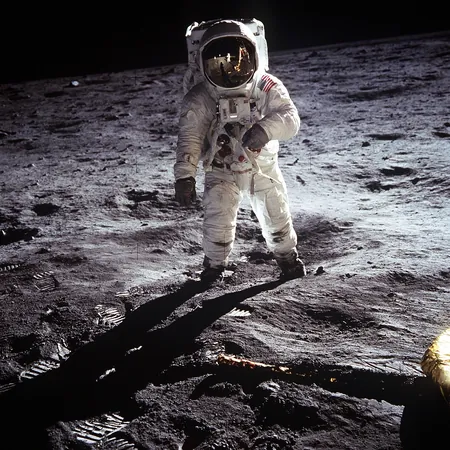
The Lunar Gold Rush: Should We Mine the Moon? Here's What You Need to Know!
2025-01-02
Author: Noah
1. Why Should We Mine the Moon?
NASA's ambitious Artemis program is not merely about returning astronauts to the moon; it aims to initiate mining operations that could change everything. Countries like China are also joining the race to explore the moon's riches. With private companies stepping in, we may see a fierce competition to harness lunar resources, potentially establishing a new cosmic supply chain that could relieve the heavy logistical burdens currently placed on Earth.
Transporting supplies to the moon is prohibitively expensive; it costs more than gold to send just a liter of water. However, if we can mine water ice on the moon and convert it into hydrogen and oxygen, we could refuel spacecraft on-site. This would revolutionize deeper space exploration, paving the way for manned missions to Mars and beyond. Additionally, the moon is rich in rare Earth metals—crucial for modern technologies like smartphones and batteries—which could help mitigate resource depletion on Earth.
2. Will Mining Alter Our View of the Moon?
Mining activities on the moon will inevitably kick up lunar dust. In an environment devoid of atmosphere, this dust can disperse widely and create visual impacts that might alter our perception of the moon from Earth. While some areas could become brighter due to exposed material, others may appear duller if dust settles back down. The management of lunar dust will become essential to ensure that mining practices are sustainable and do not irreparably change our celestial neighbor's appearance.
3. Who Has the Right to Mine the Moon?
The Outer Space Treaty of 1967 prohibits nations from claiming ownership of celestial bodies, including the moon. Yet, when it comes to resource extraction, the legality remains uncertain. The 1979 Moon Treaty declares the moon and its resources as the "common heritage of mankind," suggesting that commercial mining may be out of bounds. However, the more recent 2020 Artemis Accords allow for mining, while reiterating the non-appropriation clause of the Outer Space Treaty. This raises a fundamental dilemma: how can we ensure equitable distribution of resources harvested from the moon? Some argue that any benefits from lunar mining should be shared among all nations, not just those rich enough to venture into space.
4. What Will Life Be Like for Lunar Miners?
Picture this: after working a grueling 12-hour shift under intense conditions, you find yourself dehydrated and exhausted. In an isolated lunar colony, health and safety standards might become an afterthought, leading to dangerous situations. Under low gravity, miners face serious health risks including: - Loss of bone density and muscle mass - Increased susceptibility to osteoporosis and cardiovascular problems - Diminished immunity Moreover, the reality of cosmic radiation exposure poses significant long-term health risks, including cancer and potential infertility. The psychological toll of isolation and harsh living conditions cannot be understated either. Regulations will be crucial to protect the rights and well-being of lunar miners, as enforcement will be limited due to the distance from Earth. Charles S. Cockell, a prominent astrobiologist, warns of potential "tyranny" in space, where individuals may exploit vulnerable miners facing few options for recourse.
As we look toward the moon’s promising future as a hub for human exploration and resource extraction, we must heed the lessons of history and ensure that robust regulations focused on human rights, safety, and fair treatment are established before we embark on this cosmic adventure.
In summary, while the moon may hold incredible potential, how we approach its resources will determine the legacy we leave for future generations. Are we ready to face these challenges, or will we repeat the mistakes of our past? The countdown to lunar mining has begun, and it's time for us to act responsibly!



 Brasil (PT)
Brasil (PT)
 Canada (EN)
Canada (EN)
 Chile (ES)
Chile (ES)
 Česko (CS)
Česko (CS)
 대한민국 (KO)
대한민국 (KO)
 España (ES)
España (ES)
 France (FR)
France (FR)
 Hong Kong (EN)
Hong Kong (EN)
 Italia (IT)
Italia (IT)
 日本 (JA)
日本 (JA)
 Magyarország (HU)
Magyarország (HU)
 Norge (NO)
Norge (NO)
 Polska (PL)
Polska (PL)
 Schweiz (DE)
Schweiz (DE)
 Singapore (EN)
Singapore (EN)
 Sverige (SV)
Sverige (SV)
 Suomi (FI)
Suomi (FI)
 Türkiye (TR)
Türkiye (TR)
 الإمارات العربية المتحدة (AR)
الإمارات العربية المتحدة (AR)